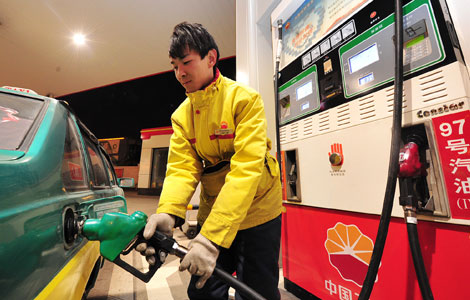Foreign demand for goods adds to air blight
Updated: 2014-01-23 07:23
By Wang Qian (China Daily USA)
|
||||||||
Study reveals connection between emissions and goods for export
Manufacturing goods in China for export contributes significantly to the country's severe air pollution problem, a recent study showed.
The research, conducted by nine Chinese and international scholars, showed that in a sample year, 2006, about 36 percent of sulfur dioxide, 27 percent of nitrogen oxides and 22 percent of carbon monoxide that was emitted by human activities came from economic processes related to exports.
And 21 percent of those emissions were tied to China's exports to the United States. The same year, 23 to 34 percent of sulfate particulate concentrations in East China were tied to export-related emissions.
"Consumption, production and pollution are related. Production of goods is to supply consumption, and at the same time it leads to pollution. We would like to look at air pollution from a consumption perspective, as an alternative to the previous production-based view," Lin Jintai, lead author of the paper and professor at Peking University, told China Daily on Wednesday.
Looking at emissions from the perspective of where goods are consumed helps elaborate the roles of different countries in global air pollutant emissions and transport, Lin said.
"We hope our study can shed some light on how China and other countries can better understand each other and strengthen cooperation in fighting against pollution," Lin said.
Air pollution is of concern globally, as some of the pollutants originating in one country can be carried by winds to other countries.
The paper, published in the US-based Proceedings of the National Academy of Sciences on Monday, said 3 to 10 percent of sulfate concentrations in the western US in 2006 were related to China's production of goods for export.
The paper said the US outsourcing of manufacturing to China may have led to cleaner air in the eastern US, and the resulting increase in Chinese emissions may have somehow led to reduced air quality in the western US.
This has had an overall beneficial effect for US public health due to the much denser population in the eastern US.
As smog in China is raising public concern and even causing worries for its neighbors, including South Korea and Japan, over the effects of air pollution, the findings are likely to trigger discussion between governments and academics about how the heavy-consuming nations can help producing countries cut air pollution.
Steven Davis, a co-author of the study and an earth system scientist at the University of California, said in a statement about the study that given the complaints about how Chinese pollution is corrupting other countries' air, the paper showed that "there may be plenty of blame to go around".
China has been the world's largest exporter since 2009, with the total value of China's exports reaching $2.21 trillion in 2013, according to the General Administration of Customs.
As the country's foreign trade is booming, air pollution is worsening in China, with a series of measurements being taken by central and local authorities to tackle pollution.
In 2013, smog hit Jiangsu, Anhui, Zhejiang, Henan, Hebei, Beijing and Tianjin for more than 100 days, twice the usual level, according to the 2013 China Climate Bulletin released by the China Meteorological Administration.
wangqian@chinadaily.com.cn
(China Daily USA 01/23/2014 page6)

 US anti-abortion rallies march for life
US anti-abortion rallies march for life
 PLA navy drills in South China Sea
PLA navy drills in South China Sea
 Catnaps help travelers keep going
Catnaps help travelers keep going
 Japan seeks US understanding about dolphin hunt
Japan seeks US understanding about dolphin hunt
 Snow storm hits US East Coast
Snow storm hits US East Coast
 China begins receiving oil from Russia
China begins receiving oil from Russia
 Underwater photos exhibited in Beijing
Underwater photos exhibited in Beijing
 Obama honors Dr King with volunteer work
Obama honors Dr King with volunteer work
Most Viewed
Editor's Picks

|

|

|

|

|

|
Today's Top News
Lawsuit blames plane’s warning systems for crash
Argentine president ends long public silence
Report shows big rise in Chinese overseas
Export adds to air blight
China approves 12 more free trade zones
Li calls for cooperative global economic system
Boeing sales soar to new heights
China to keep up with transgenics
US Weekly

|

|






